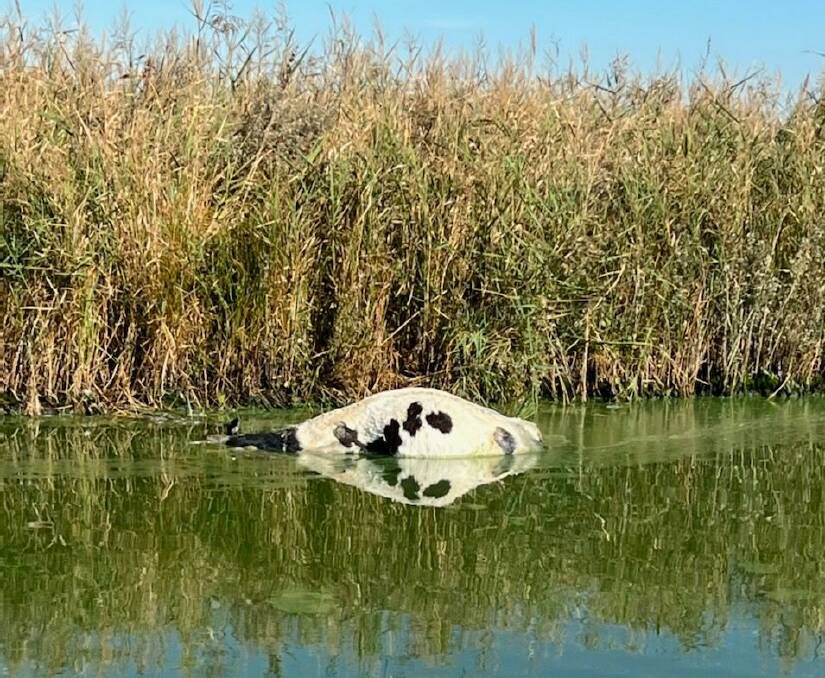
A spokesman for the Department of Environment, Land, Water and Planning has confirmed 25 dead cows have been successfully removed from the toxic waters of the Curdies River.
Subscribe now for unlimited access.
$0/
(min cost $0)
or signup to continue reading
"All deceased cattle have been removed from the waterway over the weekend," the spokesman said.
The spokesman also said DELWP suspected the cattle had died from "consumption of toxic blue green algae water" in the river. He said the vets sent by Agriculture Victoria wouldn't be able to confirm the cause of death because tests were "required to be undertaken with 24 hours" to be definitive.
He said the vets had taken samples from the cows to test for any other toxins, diseases or illnesses they may have had.
But prominent local dairy farmer and Peterborough Residents Association president Ron Irvine said the idea the cows had died from drinking the water was "rubbish" and there was plenty of "misinformation" making the rounds.
"There is no way known that they were down there drinking the water. It's brackish, it's saltwater," he said.
Mr Irvine said cows didn't drink from the Curdies River until the water turned fresh, which he estimated was well upstream around Curdievale.
"The cattle...got spooked and they ran down into the river. That's the only way it could possibly happen," he said.
"Maybe you could expect one to wander down and fall in accidentally, but not 25."
Mr Irvine, who owns pasture around the Curdies River, said all his land backing onto the river was fenced off these days, but in the many decades when it wasn't fenced off he had never lost a single cow to the river.
He said the cows belonged to a new neighbour across the river.
While he was certain the toxic water hadn't killed the cows, he said the state of the river was enormously disappointing and blamed the inaction of the authorities.
"I've been warning people since the early 1990s about the risk of blue green algae in the river and no action has been taken by the relevant authorities," he said.
"Something's got to be done because this is the third year in a row. There are too many bodies involved and no responsibility."
IN OTHER NEWS
Heytesbury District Landcare Network coordinator Geoff Rollinson said he was optimistic the catastrophe would spur the authorities into action.
"I've had a couple of conversations with the CEO of the Corangamite Catchment Management Authority and have a meeting next week to discuss the options," he said.
Mr Rollinson said he hoped the incident would bring funding for revegetation and fencing works along the river and its tributaries, which would limit fertiliser running off adjacent pastures and into the waterways.
"I would say it's well over half if not three quarters of the Curdies that still isn't fenced or vegetated," he said.
Mr Rollinson said funding for revegetation through the CCMA would be crucial, as well as incentives for farmers to do the work themselves. But he said new laws to force farmers to fence off their riverbanks were also an option.
"It's not my preferred option, the carrot is better than the stick, but if the voluntary option isn't bringing change fast enough a mandate might be necessary," he said.
He said the changing climate would only supercharge the conditions that turned the river toxic.
"I wouldn't be surprised if it became an annual occurrence if there's not substantial action."
Our journalists work hard to provide local, up-to-date news to the community. This is how you can access our trusted content:
- Bookmark https://www.standard.net.au/
- Make sure you are signed up for our breaking and regular headlines and newsletters
- Follow us on Facebook, Twitter, Instagram and LinkedIn
- Tap here to open our Google News page.
- Join our Courts and Crime Facebook group and our dedicated Sport Facebook group
- Subscribe
Now just one tap with our new app: Digital subscribers now have the convenience of faster news, right at your fingertips with The Standard:
Have you signed up to The Standard's daily newsletter and breaking news emails? You can register below and make sure you are up to date with everything that's happening in the south-west.


